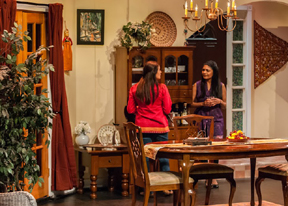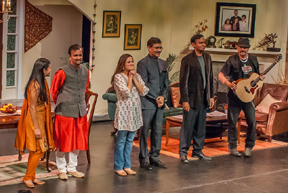 Do we all live in a doll’s house? It is not a childish question posed for fun….it is actually as relevant today, as it was 135 years ago, when Henrik Ibsen wrote the play by the same name. Its modern version had its debut last weekend at the intimate Sunnyvale Theater, where the desi overtones and a contemporary flavor of the Silicon Valley ambience resonated with the audience.
Do we all live in a doll’s house? It is not a childish question posed for fun….it is actually as relevant today, as it was 135 years ago, when Henrik Ibsen wrote the play by the same name. Its modern version had its debut last weekend at the intimate Sunnyvale Theater, where the desi overtones and a contemporary flavor of the Silicon Valley ambience resonated with the audience.
Tasteful sets as backdrops, clever use of compartmentalized space on stage, original music and lyrical song numbers created an especially intimate feel for the audience, who couldn’t help but be drawn into the unfolding saga of the lives of its five main characters.
This is the story of Naina and Tarun, a couple where the man with his condescending attitude brings in the bacon through his start up venture, although he is waiting for it to be well greased with another round of funding. The woman is relegated to domestication, and considered empty headed and trivialized despite her many capabilities and talents.
Through clever retelling of the old classic, director Basab Pradhan brings out the best in his talented cast. He himself plays the role of Dr Rajbir, a family friend, who is a voice of reason, questioning Tarun’s ideas on the place of a woman.
Despite Naina’s talents, he squashes any desire on her part to foray into the world of professional singing. She does, however, do so covertly, in order to pay off loans she has garnered through subterfuge and forgery, in order to help with Tarun’s medical expenses, when his lack of credit would not qualify for a loan.
Her subsequent anguish at the threat of being found out when blackmailed by Tarun’s employee, Kevin, who stands to lose his job, is well played by Sindu Singh, as the main character, Naina. She tries to convince herself that Tarun’s love for her would forgive her sins of forgery on loan papers, as well as her singing in a public bar in a tight dress. She acknowledges to herself that these are all things that would bring him shame and mar his honor were they to become public, as threatened by Kevin.
Naina is tormented as she justifies her actions as being born out of love for her husband; while recognizing the wrongdoing. An interesting parallel with Kevin’s character, sardonically played by Ram Asur stands out, who, too resorts to blackmail in order to protect his livelihood and provide for his young son, as well as having been fired from his earlier company on charges of embezzlement.
The tussle between the sentiments of the two is well portrayed, as Naina tries to dissuade Kevin from revealing her secrets. She is haunted by Tarun’s expected reaction and rejection, while she tries to find excuses for his behavior. Some clever dialogue writing makes it apparent that Naina believes Tarun’s righteous streak would not allow him to bend, and that she won’t let him be ruined by his shame, brought on by her actions.
An old college friend Charu, well played by Dhira Ramkrishnan, enters as a breath of fresh air, bringing a modern perspective to Naina’s cloistered living, and holds up a mirror for self examination. She questions the age old ritual of Karva Chauth, observed by fasting for a husband’s long life.
Charu herself is a modern woman, having broken tradition by divorcing her husband, who was a puppet in his conservative household. Her past connection with Kevin is an interesting twist as they now meet as lovers who could not marry earlier. Charu encourages Kevin to reveal Naina’s secret, as she does not want Naina’s life to continue to be based on lies.
Dr Rajbir mockingly spars with Tarun, deriding him for “letting” Naina fast on the occasion of Karva Chauth, as it pleases him when she shows such devotion to her husband. Tarun, convincing as a conservative Indian male who does not like his woman straying too far from the homestead, could not retort when told that this is just a self serving tradition to strengthen the male dominated nature of the society, and limit free thinking in woman.
Through subtle body language and some overt dialogue, the understanding that Naina feels she has from the doctor, is revealed as his amorous feelings for the “real” Naina, not the Naina she has become for Tarun.
Rajbir further makes profound statements about not organizing life like cookie cutter pieces, where each piece is but a single isolated facet of one’s life, such as career, family, individual etc. His morbid obsession with “designer death” and dying with dignity makes him free to exercise just such a choice in the end.
When Kevin’s threat becomes a reality, Tarun’s true emotions surface, and all of Naina’s misgivings are given form, when Tarun demands that she remove herself from parenting their two children, as she is an unfit parent. Dinesh Chandrashekharan, superbly conveys disgust and insecurity he feels as Tarun when Naina’s actions are about to crash his dream life. However, when Kevin revokes the threat, and Tarun is secure in his untarnished reputation, he reverts to his sweet talking self, even taking the blame for Naina’s misconduct, as he was not there to guide her, and forgives her. Naina begins to question her conviction about Tarun’s love, if he supports her as much as she does him, and whether his forgiveness is based on true love, or merely a means to restore normalcy to his cushy life.
Introspective musings lead Naina to conclude what she needs to do, and who she needs to be, in order to unshackle herself from emotional bondage to the men in her life; first, her father, and now, her husband, so she can become a free thinker, claim her true identity, and be a fit parent.
 Her decision to leave the security and sanctity of her home, the doll’s house, where she was merely a dressed up plaything, sets her free in order to grow and become a better person. Tarun is crushed when Naina declares her intentions, but cannot refute when she claims he is not an honorable man, rather, one who puts his warped sense of honor above all else.
Her decision to leave the security and sanctity of her home, the doll’s house, where she was merely a dressed up plaything, sets her free in order to grow and become a better person. Tarun is crushed when Naina declares her intentions, but cannot refute when she claims he is not an honorable man, rather, one who puts his warped sense of honor above all else.
Stellar acting of all cast speaks to Basab’s directorial prowess; the clever punctuation of the serious message with light-hearted, topical and pithy comments, original music compositions, sung on stage, as well as off stage by the melodious Sindu, and the subtle twists in the unfolding plot in the Indian American context, deserve a big kudos.
The Q and A session following the opening night, despite sparse audience members, was a new and effective format for instant feedback. It is troublesome that the same issues on women’s identity and her role in society continue unchanged, despite strides in women’s liberation, and other political hot buttons about the professional women’s’ role. Thanks to productions like these from the Bay Area Drama Company, the debate continues center stage.
Archana Asthana






